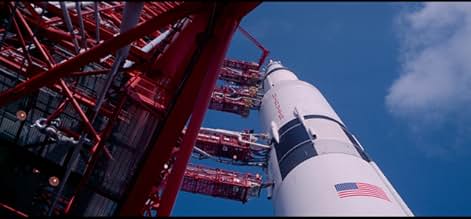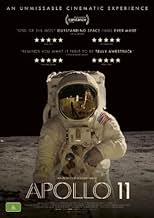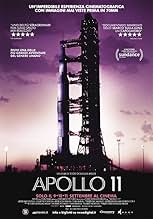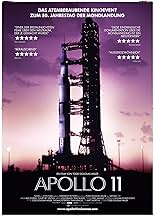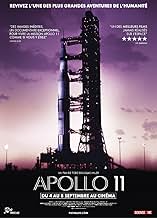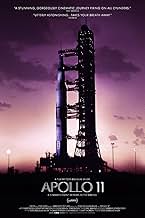AVALIAÇÃO DA IMDb
8,1/10
28 mil
SUA AVALIAÇÃO
Repaso na missão Apollo 11 liderada pelo comandante Neil Armstrong e pelos pilotos Buzz Aldrin e Michael Collins.Repaso na missão Apollo 11 liderada pelo comandante Neil Armstrong e pelos pilotos Buzz Aldrin e Michael Collins.Repaso na missão Apollo 11 liderada pelo comandante Neil Armstrong e pelos pilotos Buzz Aldrin e Michael Collins.
- Ganhou 3 Primetime Emmys
- 59 vitórias e 44 indicações no total
Neil Armstrong
- Self - Mission Commander
- (cenas de arquivo)
Mike Collins
- Self - Command Module Pilot
- (cenas de arquivo)
Buzz Aldrin
- Self - Lunar Module Pilot
- (cenas de arquivo)
- (as Edwin 'Buzz' Aldrin)
Deke Slayton
- Self - Director of Flight Crew Operations
- (cenas de arquivo)
Clifford E. Charlesworth
- Self - Flight Director Green Team
- (cenas de arquivo)
Bruce McCandless II
- Self - Capsule Commuicator (CAPCOM) Green Team
- (cenas de arquivo)
- (as Bruce McCandless)
Charles Duke
- Self - Capsule Communicator (CAPCOM) White Team
- (cenas de arquivo)
Gene Kranz
- Self - Flight Director White Team
- (cenas de arquivo)
Jim Lovell
- Self - Backup Commander
- (cenas de arquivo)
John F. Kennedy
- Self - President of the United States of America
- (cenas de arquivo)
Janet Armstrong
- Self
- (cenas de arquivo)
Patricia Mary Finnegan
- Self
- (cenas de arquivo)
Andy Aldrin
- Self
- (cenas de arquivo)
Joan Ann Archer
- Self
- (cenas de arquivo)
- (não creditado)
Walter Cronkite
- Self
- (cenas de arquivo)
- (não creditado)
Lyndon B. Johnson
- Self
- (cenas de arquivo)
- (não creditado)
Avaliações em destaque
A half-century ago, Neil Armstrong stepped off the ladder of the Lunar Module Eagle and into the history books. In the decades since, that moment and the flights of NASA's Apollo program have been chronicled in seemingly countless documentaries. At the top of that list remains 1989's For All Mankind from the late Al Reinert and 2007's In The Shadow Of The Moon from British filmmakers David Sington and Christopher Riley. Up there with them now is 2019's Apollo 11, an exciting new film from Todd Douglas Miller that is begging for you to see it on the biggest screen possible.
Why?
In part because of Miller who, like those other great filmmakers of Apollo before him, wasn't content to merely do a rehash of what had come before. Miller's Apollo 11 is in part a deep dive into the NASA archives, uncovering things that even the most seasoned space enthusiast has likely never seen before. There's a wealth of pre-launch footage, for example, tracing the preparations from the rollout of the massive Saturn V rocket to the launch pad to multiple perspectives of the launch itself. Even when events move into space, there's still a wealth of rare material to experience including conversations between the astronauts themselves as well as between them and Mission Control in Houston. Even where footage that has become synonymous with the mission and the era such as the stage separations of the rocket or the Lunar Module's descent to the surface of the Moon, it's presented with clarity and scale rarely seen elsewhere. For that alone, the film renders excellent service.
It does so in other ways, as well. Unlike those two documentaries I mentioned at the top of this review, Miller doesn't use astronaut interviews (either aural or visual) to help tell the story. Instead, Apollo 11 unfolds entirely through archival sources ranging from the transmissions to the voice of NASA's public affairs or well-known TV commentators like Walter Cronkite. To help aid visually for parts of the mission where there isn't much or anything to show, the film employees simple animation alongside such commentaries. The film also makes effective use of split-screen and captions to portray mission control or to show events such as the actual walk on the Moon from multiple perspectives. As much as the footage itself on a cinema screen does, it presents the sheer scale of the endeavor but without losing the viewer in the technicalities involved in spaceflight.
In some ways, that's the greatest triumph of Apollo 11 the documentary. It's a film keen to present Apollo 11 the mission in awe-inspiring yet understandable terms, one that emphasizes how incredible in scope and achievement that flight five decades ago this July was. It's also a reminder, at a time when cinema screens find themselves increasingly dominated by would-be blockbusters and superhero flicks, of the raw power of cinema to present stories. Both of those are things we need reminding of, it seems, and the film does a superb job of both.
Why?
In part because of Miller who, like those other great filmmakers of Apollo before him, wasn't content to merely do a rehash of what had come before. Miller's Apollo 11 is in part a deep dive into the NASA archives, uncovering things that even the most seasoned space enthusiast has likely never seen before. There's a wealth of pre-launch footage, for example, tracing the preparations from the rollout of the massive Saturn V rocket to the launch pad to multiple perspectives of the launch itself. Even when events move into space, there's still a wealth of rare material to experience including conversations between the astronauts themselves as well as between them and Mission Control in Houston. Even where footage that has become synonymous with the mission and the era such as the stage separations of the rocket or the Lunar Module's descent to the surface of the Moon, it's presented with clarity and scale rarely seen elsewhere. For that alone, the film renders excellent service.
It does so in other ways, as well. Unlike those two documentaries I mentioned at the top of this review, Miller doesn't use astronaut interviews (either aural or visual) to help tell the story. Instead, Apollo 11 unfolds entirely through archival sources ranging from the transmissions to the voice of NASA's public affairs or well-known TV commentators like Walter Cronkite. To help aid visually for parts of the mission where there isn't much or anything to show, the film employees simple animation alongside such commentaries. The film also makes effective use of split-screen and captions to portray mission control or to show events such as the actual walk on the Moon from multiple perspectives. As much as the footage itself on a cinema screen does, it presents the sheer scale of the endeavor but without losing the viewer in the technicalities involved in spaceflight.
In some ways, that's the greatest triumph of Apollo 11 the documentary. It's a film keen to present Apollo 11 the mission in awe-inspiring yet understandable terms, one that emphasizes how incredible in scope and achievement that flight five decades ago this July was. It's also a reminder, at a time when cinema screens find themselves increasingly dominated by would-be blockbusters and superhero flicks, of the raw power of cinema to present stories. Both of those are things we need reminding of, it seems, and the film does a superb job of both.
Saw the Apollo 11 IMAX film last night. Highly recommend. No narration just the NASA announcer, communications between ship and ground plus a few other bits added such as Walter and JFK now and then. Images are amazing, esp in IMAX. It moves well, no slow moments, no soap opera, no agenda, lots of unseen footage and some new stories, pure documentary, the trip is the whole story. PDI is great, TLI is great, LM separation, footage of the crowd is great. Go see, you wont be disappointed. 90 minutes long.
The film starts the morning of launch day July 16, 1969. There are no actors, no reenactments, no narrator. It is 100% restored archival footage and recorded audio, most of which I had never seen before. Opening footage of the crowds gathering around Kennedy Space Center gave you the sense it was apparent to everyone the magnitude of what was about to happen.
They had audio and video of (an issue I won't spoil, something during launch prep I had never heard of before). Obviously there is no external footage of the spacecraft from the time it leaves earth orbit until it arrived at the moon but the editing and coverage used are excellent and you never feel like you're in the dark or missing out.
There is no attempt made at politicizing the event or manipulating the viewer, it is raw, factual cinéma vérité. Although I did find Kennedy's speech moving, they made the excellent choice to NOT show the famous portion we've all heard about landing a man on the moon and returning him safely by the end of the decade. It was the rest of that speech, which I'm not sure I'd ever heard, that was astute, prophetic and even funny at one point.
My one very minor caution is that viewers who aren't already aware how critical/dangerous some maneuvers were could miss out on the gravity of the situation. The filmmakers do assist with this with the score, which is absolutely fantastic (and according to the credits, composed entirely with instruments available in July '69), and some minor on-screen graphics (e.g. FUEL 30 seconds, 1202 alarm). It's a trivial concern but viewers who are familiar with the space program in general, and this mission in particular, will get the most out of the experience.
The film wraps up after our astronauts are safely home and cleared from quarantine. During the credits there are a few more interesting shots of some of the celebrations.
They had audio and video of (an issue I won't spoil, something during launch prep I had never heard of before). Obviously there is no external footage of the spacecraft from the time it leaves earth orbit until it arrived at the moon but the editing and coverage used are excellent and you never feel like you're in the dark or missing out.
There is no attempt made at politicizing the event or manipulating the viewer, it is raw, factual cinéma vérité. Although I did find Kennedy's speech moving, they made the excellent choice to NOT show the famous portion we've all heard about landing a man on the moon and returning him safely by the end of the decade. It was the rest of that speech, which I'm not sure I'd ever heard, that was astute, prophetic and even funny at one point.
My one very minor caution is that viewers who aren't already aware how critical/dangerous some maneuvers were could miss out on the gravity of the situation. The filmmakers do assist with this with the score, which is absolutely fantastic (and according to the credits, composed entirely with instruments available in July '69), and some minor on-screen graphics (e.g. FUEL 30 seconds, 1202 alarm). It's a trivial concern but viewers who are familiar with the space program in general, and this mission in particular, will get the most out of the experience.
The film wraps up after our astronauts are safely home and cleared from quarantine. During the credits there are a few more interesting shots of some of the celebrations.
The restored 70mm footage looks like it was shot yesterday. It will make your jaw drop on the massive screen. There's something simply astounding about old restored 35mm, 65mm and 70mm footage viewed in full resolution today - it's like stepping into a time-machine and being transported, like you are really there. Any 70mm footage projected on an IMAX screen is simply magical, but this is not just real footage, but footage capturing possibly the most important moment in human history - certainly the most inspiring. You won't be able to experience the same thing at home, so I wish everyone would go out to their local IMAX and experience this first-hand. This is the kind of thing schools should require their students to experience.
The only reason I don't give it a perfect 10/10 is that because the film is made in a cinéma-vérité style, the audience simply experiences the event without really learning very much about the incredible engineering, science, training and logistics of the incredible Apollo program. So I hope this film inspires people to also seek out The Right Stuff (1983), Apollo 13 (1995), the massively underrated miniseries From the Earth to the Moon (1998) and the invaluable documentary In the Shadow of the Moon (2007) - possibly the definitive documentary about the Apollo program - which you should watch as a companion piece to this film.
The only reason I don't give it a perfect 10/10 is that because the film is made in a cinéma-vérité style, the audience simply experiences the event without really learning very much about the incredible engineering, science, training and logistics of the incredible Apollo program. So I hope this film inspires people to also seek out The Right Stuff (1983), Apollo 13 (1995), the massively underrated miniseries From the Earth to the Moon (1998) and the invaluable documentary In the Shadow of the Moon (2007) - possibly the definitive documentary about the Apollo program - which you should watch as a companion piece to this film.
Todd Douglas Miller's documentary Apollo 11 is a rich buffet of restored footage, clever image juxtaposition, and ingenious lip reading. There is SO MUCH newly-released footage, one gets the impression that 1/4 of the mission weight must've been cameras and film! Where have these images been for fifty years? There's no narration... just sounds and voices from the mission, peppered with occasional contemporaneous commentary from Walter Cronkite's legendary broadcasts. The film is a beautiful, visceral thrill ride, lovingly constructed, without aggrandizement... yet emotions soar. This is what America once was, and what it could be again, and I absolutely do not mean that in any jingoistic sense. Truly our finest moment. See it in IMAX if you can - IT IS WORTH IT.
Você sabia?
- CuriosidadesSeveral of the recordings captured by the astronauts during the mission are featured in this documentary. These recordings by Neil Armstrong, Buzz Aldrin and Mike Collins earned them honorary memberships in the American Society of Cinematographers.
- Erros de gravaçãoThe incident involving Buzz Aldrin's bio-med sensors going out, leading him to crack wise, saying, "I promise I will let you know if I stop breathing," occurred during the return voyage, on day 8 of the mission, but is depicted (at approx 48 minutes into the film) as happening during the approach to the moon before the separation of the command and lunar modules.
- Citações
Neil Armstrong: One small step for man... one giant leap for mankind.
- Versões alternativasIn 2019, an edited version of the film, cut down to 45 minutes for exhibition in museum IMAX theaters, was released as Apollo 11: First Steps.
- ConexõesFeatured in WatchMojo: Top 10 Best Movies of 2019 (So Far) (2019)
- Trilhas sonorasMother Country
Written and Performed by John Stewart
Principais escolhas
Faça login para avaliar e ver a lista de recomendações personalizadas
Detalhes
- Data de lançamento
- País de origem
- Centrais de atendimento oficiais
- Idioma
- Também conhecido como
- Apollo 11: First Steps
- Locações de filme
- Sea of Tranquility, The Moon, Space(Apollo 11 landing site)
- Empresas de produção
- Consulte mais créditos da empresa na IMDbPro
Bilheteria
- Faturamento bruto nos EUA e Canadá
- US$ 9.039.891
- Fim de semana de estreia nos EUA e Canadá
- US$ 1.607.040
- 3 de mar. de 2019
- Faturamento bruto mundial
- US$ 15.343.649
- Tempo de duração1 hora 33 minutos
- Cor
- Mixagem de som
- Proporção
- 2.20 : 1
Contribua para esta página
Sugerir uma alteração ou adicionar conteúdo ausente







